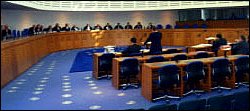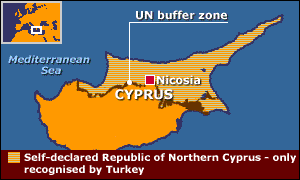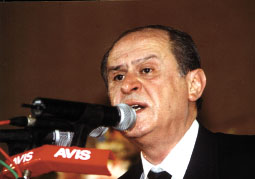5
June 2002
![]()
2. "European rights court slams Turkey for imprisoning pro-Kurd for life", the European Court of Human Rights condemned Turkey on Tuesday for violating the rights of a man who was sentenced to life in prison for giving a pro-Kurdish speech. Esber Yagmurdereli, a partially-blind lawyer and writer, received a life sentence in 1985 for "attempting to overthrow the constitutional order."
3. "Council of Europe's No. 2: Political and diplomatic pressure to be put on Turkey", political and diplomatic pressure will be put on Turkey for the implementation of the decisions of the European Court of Human Rights, Council of Europe Deputy Secretary-General Hans Christian Kruger said on Tuesday.
4. "A divided Cyprus could become member of the EU - Danish prime minister", 'The EU would be reluctant to accept unsolved border problems within the union,' Fogh Rasmussen said after meeting with Cypriot President Glafcos Clerides. 'A solution to the Cyprus problem would be an advantage, but it is not a condition for enlargement'.
5. "No concessions over EU: MHP", MHP leader Bahçeli said that there is time to resolve the issues of banning capital punishment and allowing education and broadcast in mother tongues as they medium term targets.
6. "Report on Iraqi Kurdish Leaders' Meeting With US Officials", Al-Hayat learned that leaders of the two major Kurdish parties held meetings in the United States last month, including meetings with US Secretary of Defense Donald Rumsfeld and senior advisers to President George Bush and Vice President Dick Cheney.
1. - AFP - "Rift over EU adds to ailing Turkish PM Ecevit's troubles":
ANKARA / 4 June 2002 / by Sibel Utku
The Turkish government's nationalist wing renewed opposition Tuesday
to democracy reforms demanded by the EU, adding to already rife fears
of political instability triggered by the ill health of Prime Minister
Bulent Ecevit.
Deputy Prime Minister Devlet Bahceli, the head of the Nationalist Action Party (MHP), warned that some of the reforms demanded from Ankara by the European Union could jeopardize the country's unity. "The extreme care employed so as not to miss the EU train should also be shown for Turkey's national unity and interests," Bahceli said in parliament.
His remarks came ahead of a crucial meeting on Friday between President Ahmet Necdet and government and opposition leaders, which Sezer called in the face of mounting concerns that Ankara will fail to get a date for the start of accession talks by year-end. MHP resistance is seen as the main barrier in the way of key democracy reforms such as the abolition of capital punishment and the legalization of broadcasts and education in the language of the sizable Kurdish minority.
Recent media reports have said the powerful Turkish military, also seen as an opponent to EU reforms, will agree to the lifting of capital punishment and Kurdish cultural freedoms under certain conditions. The military-dominated National Security Council urged the government last week to speed up work for EU membership and "recommended" that emergency rule in Kurdish regions in the southeast end this year. The government rift over EU reforms comes atop fears of political turmoil due to the ill health of Ecevit, who spent the past month either in hospital or at home, with a long list of ailments. Bahceli cast doubt on whether all democracy reforms would benefit Turkey.
"Reforms which are said to be prevented are firstly legal and institutional arrangements which will strengthen ethnic divisions and, secondly, the immediate abolishment of the death penalty," he said. The MHP is against the death penalty's abolition, arguing that Kurdish rebel leader Abdullah Ocalan, Turkey's number one public enemy, should not go unpunished. Ocalan, the head of the Kurdistan Workers Party (PKK), was sentenced to death in 1999 for the PKK's 15-year separatist war in the mainly Kurdish southeast. His execution has been suspended until the European Court of Human Rights rules on his complaints against Ankara.
Bahceli said Ocalan's death sentence should be brought to parliament for approval following the ruling of the court. He also said "Turkey must think at least three times" before allowing Kurdish-language broadcasts and education. Government stability is vital for Turkey at a time when it is battling a severe economic crisis with multi-billion-dollar loans from the International Monetary Fund, which saved the country from the brink of a financial collapse in February.
Turkey's volatile markets are already unnerved over Ecevit's health, fearing that his departure from office could destroy the coalition and prompt early elections. Ecevit, 77, has been hospitalized twice since early May, suffering from a neuromuscular disease, a cracked rib, spinal problems and an inflamed leg vein. Bahceli backed Ecevit's insistance to stay in office and stressed that early elections should be avoided, but for the first time also spoke about scenarios without Ecevit.
If the premier quits, the coalition should stay in power
until a new government is formed out of the current parliament, he said.
He added, however, that if such an administration becomes impossible,
then the next option would be the formation of a government with support
from the parliament, which would hold elections "at a certain time".
![]()
2. - AFP - "European rights court slams Turkey for imprisoning pro-Kurd for life":
STRASBOURG / 4 June 2002
The European Court of Human Rights condemned Turkey on Tuesday for
violating the rights of a man who was sentenced to life in prison for
giving a pro-Kurdish speech. Esber Yagmurdereli, a partially-blind lawyer
and writer, received a life sentence in 1985 for "attempting to
overthrow the constitutional order."
After being released on parole in 1991, he was imprisoned again for spreading "separatist propaganda" in a speech that used the word "Kurdistan" and mentioned the "struggle for democracy and freedom" carried out by the outlawed Kurdistan Workers' Party (PKK). He was released in January 2001. At the time, Turkey said that under its 1995 Prevention of Terrorism Act, it had the right to violate a citizen's right to expression if they deemed him a threat to national security. The human rights court said that Yagmurdereli's conviction "amounted to an interference with his right to freedom of expression" and found it guilty of violating Article 10 of its charter, governing the right to expression.
"Although some parts of the speech were evidently
not 'neutral,' the Court did not construe them as being capable of provoking
hatred and violence between citizens," it said in the ruling. The
PKK fought for self-rule in southeastern Turkey since 1984 and fought
for 15 years before being outlawed, while Turkey continues to be criticized
for the lack of rights it provides to its Kurdish minority. ![]()
3. - Turkish Daily News - "Council of Europe's No. 2: Political and diplomatic pressure to be put on Turkey":
ANKARA / 5 June 2002 / by Saadet Oruc 
Political and diplomatic pressure will be put on Turkey for the
implementation of the decisions of the European Court of Human Rights,
Council of Europe Deputy Secretary-General Hans Christian Kruger said
on Tuesday.
In an exclusive interview with the Turkish Daily News (TDN) in Ankara, Kruger, who chose his words carefully, stated that messages will continue to be given to Turkey regarding the fulfillment of the demands of the Council of Europe.
He also stated that monitoring by the Council of Europe will continue.
However, the top Council of Europe official ruled out the possibility of suspending Turkey's membership to the council.
"That is not a realistic option and I don't think that any country will support the ending of Turkey's membership to the Council of Europe," Kruger said.
"I don't think that Turkey will continue not to implement the court decision. Sometimes, the implementation can take time, such as in a case related to Belgium. Belgium realized a court decision after ten years," Kruger stated, in response to insistent questions over the reluctance of Turkey to implement the decisions made by the Council of Europe during a meeting with Sami Selcuk, the head of the Court of Cassasion.
However, strong measures will be taken as well as severe, vocal criticisms against Turkey, Kruger added.
Kruger met with State Minister responsible for human rights Nejat Arseven, Justice Minister Hikmet Sami Turk, Constitutional Court head Mustafa Bumin and Selcuk during a courtesy visit before retiring.
Reforms are welcomed
Kruger also spoke positively vis-a-vis the reforms realized by the Turkish government.
"The exclusion of the military judge from the State Security courts and his being replaced by a civilian one was an important step taken by Turkey. Secondly, the constitutional amendments, the abolition of the death penalty, the reform of the prison system, which was the modernization of the old-fashioned prison system which was recommended by the Committee to Prevent Torture (CPT) and the abolition of Emergency Rule (OHAL) are encouraging steps concerning the improvement of the death penalty," Kruger said, listing the improvements which have caused optimism in Europe.
Ocalan: No way out!
Regarding the death penalty, and in reference to the punishment given to Abdullah Ocalan, the imprisoned leader of the Kurdistan Workers' Party (PKK), Kruger stated that there was no way out for Turkey.
"As a founding father of the Council of Europe, Turkey has to abolish the death penalty and ratify protocols on the issue, especially Protocol 6," he said.
Pointing out that he was aware of the opposition in Turkey against the abolition of the death penalty, Kruger said that it was a consequence of being a member of the club.
"Sometimes, you follow the rules of the club," he continued.
Retrial
Kruger also emphasized the need for the right to a retrial in the Turkish legal system, at every stop on his chain of visits in Ankara.
Concerning party closures, Kruger said that unconstitutional acts by a party may result in its closure, pointing out that this was his personal view.
As Kruger was paying a farewell visit, he refrained from
raising eyebrows in Ankara. The top Council of Europe official preferred
to warn officials of possible future developments behind closed doors,
speaking with diplomatic caution during press interviews. ![]()
4. - Turkish Daily News - "A divided Cyprus could become member of the EU - Danish prime minister":
'The EU would be reluctant to accept unsolved border problems within the union,' Fogh Rasmussen said after meeting with Cypriot President Glafcos Clerides. 'A solution to the Cyprus problem would be an advantage, but it is not a condition for enlargement'
ANKARA / 4 June 2002
Danish Prime Minister Anders Fogh Rasmussen said Monday that the
admission of a divided Cyprus to the European Union would not depend
on reunification of the Mediterranean island.
"The EU would be reluctant to accept unsolved border problems within the union," Fogh said after meeting with Cypriot President Glafcos Clerides. "A solution to the Cyprus problem would be an advantage, but it is not a condition for enlargement."
He stressed, however, that "a solution to the problem would definitely be an advantage."
Denmark takes over the six-month, rotating EU presidency on July 1 and has made enlargement a priority.
EU leaders have said they expect Cyprus, Malta, Poland, Slovenia, Hungary, Latvia, Lithuania, the Czech Republic, Slovakia and Estonia to be ready to join the 15-nation bloc in 2004.
Last month, U.N. Secretary General Kofi Annan failed to revive the U.N. sponsored reunification talks. Clerides and Greek Premier Costas Simitis eventually met to deal with the deadlock.
Turkey, which also wants to join the EU, has threatened to annex the north, if the island joins before its reunification as a federation of two independent states.
Clerides, who was on a one-day visit to the Danish capital, said he would continue work to resolve the 28-year dispute, although it was not a condition for joining the EU.
"We do want to find a solution of the Cyprus problem as soon as possible," Clerides said. "The island has been divided too long."
Fogh said he expected that the EU leaders would make a decision on Cyprus and the nine other candidate countries at an EU summit in Copenhagen in December.
"At the end of the day, the European (summit) will take all relevant factors into consideration," Fogh said.
Meanwhile, the President of Northern Cyprus (KKTC) Rauf Denktas accepted Sweden's Cyprus Special Representative Ingemar Lindahl. Denktas said that they could not be successful in the solution of the problem and lost 39 years because of not determining the problem in a true way.
"We wish the states, who's appointed coordinators
gave up to see only the Greeks viewpoint and find out what is the real
reason of the problem and why couldn't it be solved up till now"
said Denktas. ![]()
5. - NTV / MSNBC - "No concessions over EU: MHP":
MHP leader Bahçeli said that there is time to resolve the issues of banning capital punishment and allowing education and broadcast in mother tongues as they medium term targets.
5 June 2002
Turkey’s far right National Movement Party (MHP) has decided
that it will not make any concessions over its position on the European
Union accession process and the steps that Turkey has to take to qualify
for EU membership.
An expanded executive board of the MHP held a three hour long meeting to discuss the party’s position on the issues ahead of a June 7 meeting of party leaders called by President Ahmet Necdet Sezer to try and establish consensus over Turkey’s approach to gaining acceptance into the EU.
At its Tuesday meeting, the MHP executive took the decision that it would make no concessions over what it described as national sensitivities.
The leader of the party and deputy Prime Minister Devlet
Bahçeli stressed that MHP views over the lifting of the capital
punishment, education and broadcasting rights in mother tongue and the
Cyprus question have been clear and would continue on the same line.
![]()
6. - Al Hayat - "Report on Iraqi Kurdish Leaders' Meeting With US Officials":
2 June 2002 / Translated by Kurdistan Observer
Al-Hayat learned that leaders of the two major Kurdish parties held
meetings in the United States last month, including meetings with US
Secretary of Defense Donald Rumsfeld and senior advisers to President
George Bush and Vice President Dick Cheney.
Kurdish sources refused to elaborate on these meetings,
but said that Jalal Talbani, leader of the Patriotic Union of Kurdistan,
and Mas'ud Barzani, leader of the Kurdistan Democratic Party, held a
meeting with senior US officials, including representatives of the American
Central Intelligence Agency, CIA, to coordinate political and military
moves against the regime of President Saddam Hussein. 
The sources added that the meeting between the two Kurdish leaders and
a number of senior officials in the administration of President Bush,
which followed a previous meeting that was held in Germany on 20 April,
was designed to dispel Iraqi Kurds' fears about their situation should
Washington carry out a massive military action against Baghdad.
The meeting was also aimed at clearing the air with the
Turkish Government, especially the military wing of that government,
which is skeptical about the Kurds' future intentions, the sources continued.

The Kurdish sources pointed out that there has been a radical shift
in the US stand toward preparations for a US move on the Iraqi front.
Thus, the sources added, the current US discussions with the opposition
parties shifted from the consultation phase to the phase of working
out specific scenarios of action that will achieve the US interests
on the one hand and fulfill the Iraqi opposition forces' demands on
the other.
Meanwhile, US sources specialized in Iraqi affairs said the US Administration
expressed its displeasure with information leaked to the press by various
wings in the administration and added that such information harms Bush's
policy.
The same sources said they believe that the surprise visit to Irbil by the Turkish army deputy chief of staff two weeks ago during which the latter met with Barzani, was part of efforts to lessen the disagreements between Ankara and Barzani, as Washington desires.
The sources disclosed that at their meeting with the Kurdish
leaders at the CIA headquarters in (Langly), the US officials called
for reopening two CIA stations in Iraqi Kurdistan many years after they
were closed following sharp disagreements between Barzani and Talbani
in 1996. But, according to the same sources, the Kurdish side asked
for US guarantees to protect the region in anticipation of an Iraqi
retaliatory action. ![]()